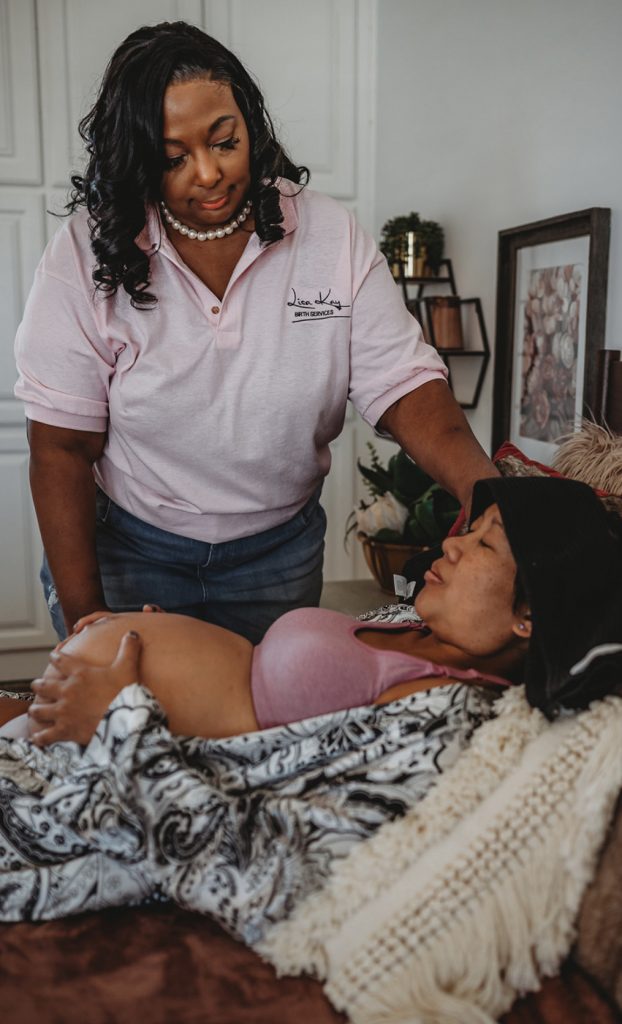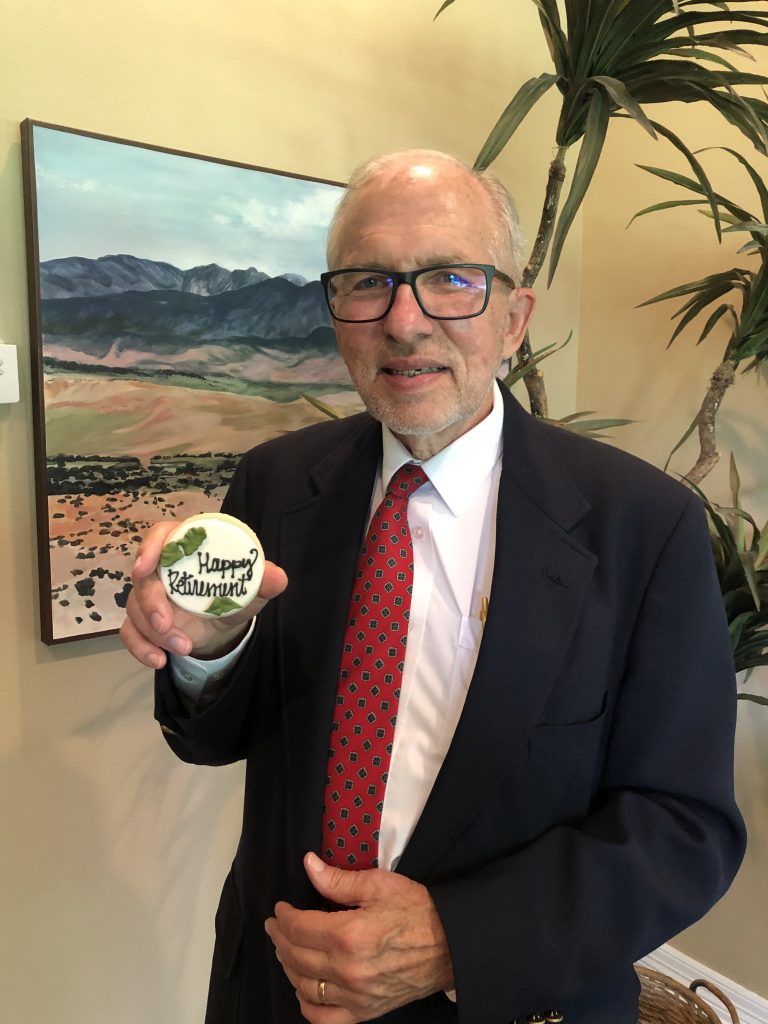A profession is on the rise nationally to provide emotional support through the two life events we can all count on. Birth doulas and death doulas are popping up in web searches and through referrals.
While family and community members have gathered around loved ones for emotional support during birth and death for millennia, the professional doula arose in the 1970s and ‘80s.
To date, the profession remains unregulated, with no recognized state or national licensing. There are, however, a variety of programs offering training and certification.
In East Texas, who offers doula assistance when someone seeks trained care beyond medical professionals, friends and family?
Lisa Williams is a Tyler resident and Licensed Vocational Nurse who offers birth doula services. Tom Haygood is a Lindale resident and family life coach who offers death doula services.
The Tyler Loop sat down with Williams and Haygood to learn more about the role of a doula and what East Texas needs prompted them to take on this career.
Meet birth doula Lisa Williams

Williams said being a birth doula entails emotional support and physical comfort for a mother. “We assist a person to carry out their plans for birth. We also do prenatal visits and teach about breastfeeding,” she said.
Williams’ desire to become a birth doula stemmed from learning infant mortality statistics she came across during a seminar with the NAACP. A birth doula of 25 years was the guest speaker and showed a documentary produced by Lindell Singleton called The Gap: The Truth about Infant Mortality in America.
After that, Williams dove into research about birth experiences, especially for Black mothers. “He was telling us how many babies don’t live to their first birthday. And I was like, ‘Wait a minute, whoa.’”
Williams discovered that north of Loop 323 in Tyler, Texas, the child mortality rate for Black women is 15.9 per thousand births in Tyler ZIP code 75702.
Because of the risks, especially for Black women, Williams’ role as doula focuses on advocacy and empowerment, part of which includes a shift from following doctors’ orders to knowing your options and speaking up.
Williams said giving birth is potentially fraught with disturbance and violence to mothers. “Your birth should not be traumatizing. A lot of people get PTSD just from having a baby. That shouldn’t be happening. It’s happening to a lot of Black people but to women of all colors, too.”
To her knowledge, Williams and her partner doula, also a nurse, are the only Black birth doulas in Tyler and Smith County.
“We advocate for the mother to make her decisions,” said Williams. “That’s your body. You own your body. There should be an agreement. You should have a birth team and you go in with your birth plan.”
When it comes to labor and delivery, Williams would especially like changes in C-sections.
“If they tell you to have a C-section, ask why. C-sections are the [most popular] surgery there is, followed by hysterectomy. And you don’t have people to question it.
“A lot of people say it’s an emergency. What’s the emergency? You go pull the paperwork, it wasn’t an emergency,” said Williams.
While doulas provide physical, emotional and spiritual support, Williams said they cannot provide medical care. As Williams provides support, she tailors to the mother’s preferences.
“Everybody might not be faith-based. Some people have different ways they believe. They might not believe in God. So you have to cater to whatever they need,” she said.

Williams’ care includes affirmations as a mother goes through pregnancy.
“You want to provide that emotional support with affirmations early in the morning. Women go through a lot with their hormones. They feel sad some days, they don’t feel pretty because their body’s constantly changing.”
As a birth doula, Williams’ care extends to women who experience miscarriage, abortion and stillbirth.
Of one of Williams’ clients who had a miscarriage, she said, “You still had a birth and postpartum. A lot of people don’t realize even though you lose a baby, you still gave birth. You still went through the whole ordeal.”
In those cases, Williams said her care focuses on coping skills, being available to talk and offering good nutrition. “We have to work past the postpartum depression, take care of them and provide resources,” she said.
In one instance, Williams referred her client to Mosaic Counseling Center (formerly Samaritan). “My services don’t stop with me; I have resources who can help,” she said.
Williams noted her appreciation for local WIC offices and Nurse Family Partnership. “They stay with a mom for two years and follow them through. That’s a great program,” she said.
Williams encourages her clients to look for hospitals with a baby friendly designation. Another rating women preparing to give birth can research is the doctor’s rate of C-section. Williams is especially interested in advocacy for Black East Texas women, who face greater health hazards.
A Regional Analysis of Maternal and Infant Health in Texas for East Texas public health region 4/5N reported multiple greater risks for Black mothers, including higher instances of low birth weight, preterm births, later entry into prenatal care, pre-pregnancy obesity, hypertension and rates of postpartum depression.
“Black women, most of our concerns are dismissed. Being a Black woman by itself comes with a lot of stress. With the extra stress you have chronic diseases and high blood pressure. They call it weathering.”
For Williams, the best maternal healthcare happens when medical care is free from judgment. “They shouldn’t be judged by the color of their skin. They shouldn’t be judged whether they have insurance or not. They shouldn’t be judged if they have five or six kids.They shouldn’t be judged if they’ve got tattoos. They shouldn’t be judged if they are LGTBQ. They should be just like everybody else.”
As for positive data for women who have had a birth doula, Williams said
they are 28% less likely to have a C-section; 31% less likely to have oxycontin to speed up labor; and 34% least likely to rate their childbirth experience negative.
More than anything, Williams embraces her role as advocate. “I want people to know they have a right to informed consent about their body and what they want.”
Meet Death Doula Tom Haygood

Tom Haygood embraced the role of death doula primarily because of the death of his first wife. “It was such a shock to say goodbye to my wife. In one of the small group Bible studies I’ve been a part of here in Lindale, one night someone said, ‘I went to a weekend training to death doula.’ So she introduced it to me.”
Haygood said he wants to help facilitate a conversation many are reluctant to have. “We’ve had birth doulas around for a long time, but we don’t have a lot of preparation for what we’re all going to face. When death comes, most of us are not ready for it, so we need to have a conversation about death.”
Haygood said a death doula’s work is similar to a hospice chaplain. Haygood, whose first wife spent time at Hospice of East Texas HomePlace before her death, appreciates their services. “Hospice is unbeatable. They offer chaplains, social workers, great nurses,” he said.
Haygood said some death doulas can go beyond what nurses and chaplains do by guaranteeing to be present when a loved one dies. “Even in the hospitals or with hospice, people die [alone] because the nurses are overwhelmed,” he said.
Haygood’s services are meant for anyone preparing for death. “Regardless of their philosophical orientation, religious background or world view, [the death doula] has a job of just being with the family and preparing. I can sit with a Buddhist. I can sit with an atheist. I would not try to force my way on them.”
Haygood said it’s vital that a loved one’s wishes are addressed while they are still able to communicate. In hindsight, he would have asked his wife a series of questions about her preferences during her hospice stay: “Do you want music? What kind of music? Do you want light; do you want darkness? Do you want visitors? How many? Are there people you don’t want to see? I will honor that.”

Along with certainty that a patient is a willing party preparing for their death, Haygood detailed other aspects of his doula practice. “We call it the vigil, the last four or five days. It’s a waiting period. I believe the spirit may be more aware of what’s going on than the family may know,” said Haygood.
During active death, a doula’s role transitions to caring for the loved one’s family, said Haygood. “[At the] actual passing, do you want a ritual, a prayer or anointing oil? Do you want some kind of religious ceremony?”
A death doula facilitates the family’s wishes immediately after death, said Haygood, including bathing the body or retrieving a lock of hair.
After the vigil and death, Haygood’s last step is following up with the family. “Six weeks later, you sit down with the family and debrief. And they all laugh and share stories and encourage each other,” he said.
Haygood’s location and social circles put him in contact with people preparing for the end of life. “The average age in Hideaway is 70, probably. In March in our church, there were probably 12 deaths,” he said.
In addition to providing emotional and spiritual support, Haygood is an advocate for following a patient’s wishes when they are ready to die.
He recounted his wife’s decision when she was in acute stages of cancer. “We took three weeks and prayed about it and talked about it and decided not to do any chemotherapy,” he said.
Haygood said there is a population of East Texans who may especially benefit from learning and talking more about death. “I am so grateful we are beginning to talk about this in East Texas. I can understand the struggle that evangelicals tend to have: pro-life life at any cost.
“I’m surprised how many Bible-believing Christians are afraid to get on hospice if they believe the Bible and that we are going to a better place.
“You live in denial, and I don’t think denial is healthy. I think it’s a defense mechanism against anxiety,” said Haygood.
As for a patient’s relationship to their doctor or medical system, Haygood said he wants clients to know their responsibility in end-of-life decisions. “If the doctor says he’s right or she’s right, when you get 10 physicians, you’re going to have 10 different opinions. So whose life is it?”
Haygood said that, in contrast to the developing world, 70% of all deaths in the U.S. occur in an institution, sometimes with no family members present. “We in America have lived such a sheltered life and we think we’re living the best life. I think it’s a fake life,” he said.
Ultimately, Haygood wants loved ones and their families to have agency. ”I want to see the family have choices and medical science is there as a resource. There needs to be somebody who will be able to talk to the medical people and say, ‘Look, this needs to be done.’”
Love what you're seeing in our posts? Help power our local, nonprofit journalism platform — from in-depth reads, to freelance training, to COVID Stories videos, to intimate portraits of East Texans through storytelling.
Our readers have told us they want to better understand this place we all call home, from Tyler's north-south divide to our city's changing demographics. What systemic issues need attention? What are are greatest concerns and hopes? What matters most to Tylerites and East Texans?
Help us create more informed, more connected, more engaged Tyler. Help us continue providing no paywall, free access posts. Become a member today. Your $15/month contribution drives our work.







